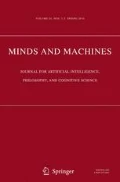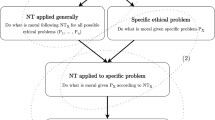Abstract
Heuristics can be regarded as justifying the actions and beliefs of problem-solving agents. I use an analysis of heuristics to argue that a symbiotic relationship exists between traditional epistemology and contemporary artificial intelligence. On one hand, the study of models of problem-solving agents usingquantitative heuristics, for example computer programs, can reveal insight into the understanding of human patterns of epistemic justification by evaluating these models' performance against human problem-solving. On the other hand,qualitative heuristics embody the justifying ability of defeasible rules, the understanding of which is provided by traditional epistemology.
Similar content being viewed by others
References
Chisholm, R. M. (1989),Theory of Knowledge, third ed., Englewood Cliffs, NJ: Prentice-Hall.
Fikes, R. E. and Nilsson, N. J. (1971), ‘STRIPS: A New Approach to the Application of Theorem Proving to Problem Solving’,Artificial Intelligence 2, pp. 189–208.
Goldman, A. I. (1986),Epistemology and Cognition, Cambridge, MA: Harvard University Press.
Korf, R. E. (1992), ‘Heuristics’, inEncyclopedia of Artificial Intelligence, second ed., John Wiley and Sons, pp. 611–615.
McCarthy, J. (1980), ‘Circumscription — A Form of Nonmonotonic Reasoning’,Artificial Intelligence 13, pp. 27–35.
McDermott, D. and Doyle, J. (1980), ‘Nonmonotonic Logic I’,Artificial Intelligence 13, pp. 41–72.
Minton, S., Bresina, J., and Drummond, M. (1991), ‘Commitment Strategies in Planning: A Comparative Analysis’,Proceedings of the Ninth National Conference on Artificial Intelligence.
Nute, D. (1988), ‘Defeasible Reasoning: A Philosophical Analysis in Prolog’, in J. Fetzer, ed.
Pollock, J. L. (1987), ‘Defeasible Reasoning’,Cognitive Science 11, pp. 481–518.
Quine, W. V. O. (1973), ‘Epistemology Naturalized’, in Chisholm, R. M. and Swartz, R. J., eds.,Empirical Knowledge: Readings from Contemporary Sources, Englewood Cliffs, NJ: Prentice-Hall, pp. 59–74.
Reiter, R. (1980), ‘A Logic for Default Reasoning’,Artificial Intelligence 13, pp. 81–132.
Sacerdoti, E. D. (1974), ‘Planning in a Hierarchy of Abstraction Spaces’,Artificial Intelligence 5, pp. 115–135.
Author information
Authors and Affiliations
Rights and permissions
About this article
Cite this article
Colburn, T.R. Heuristics, justification, and defeasible reasoning. Mind Mach 5, 467–487 (1995). https://doi.org/10.1007/BF00974978
Issue Date:
DOI: https://doi.org/10.1007/BF00974978




